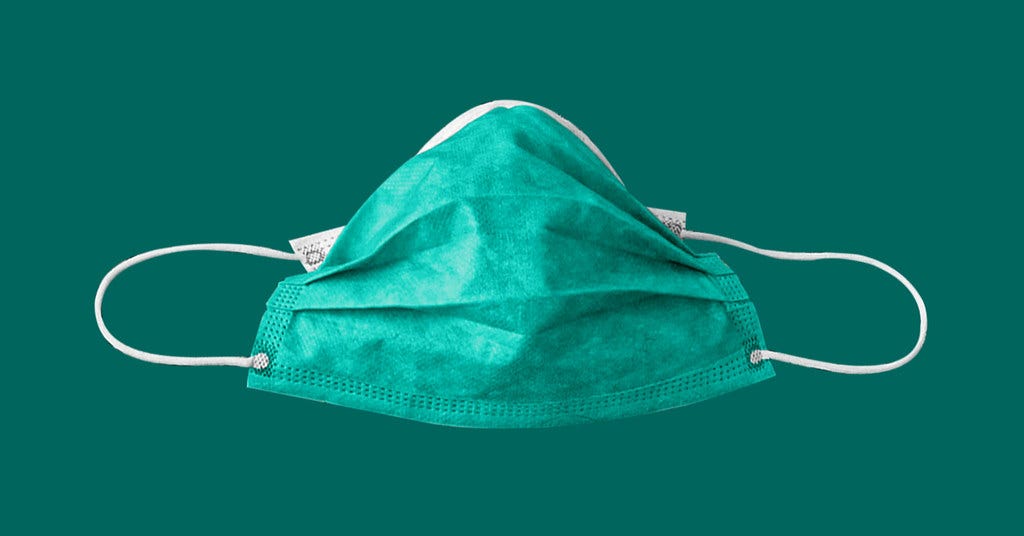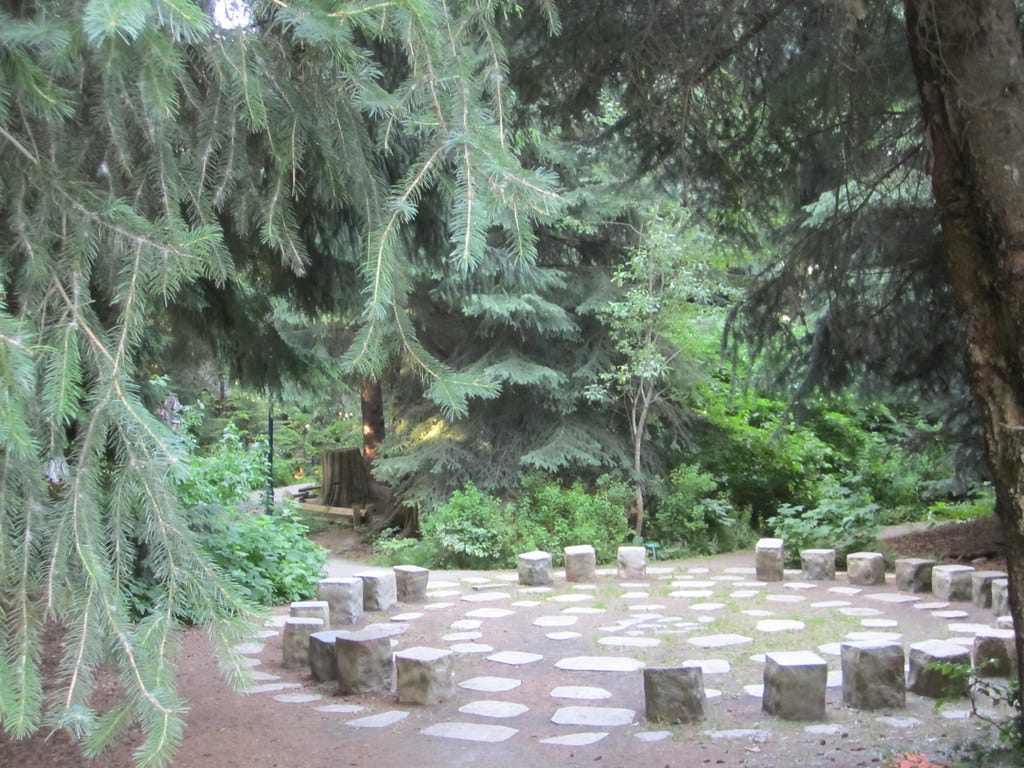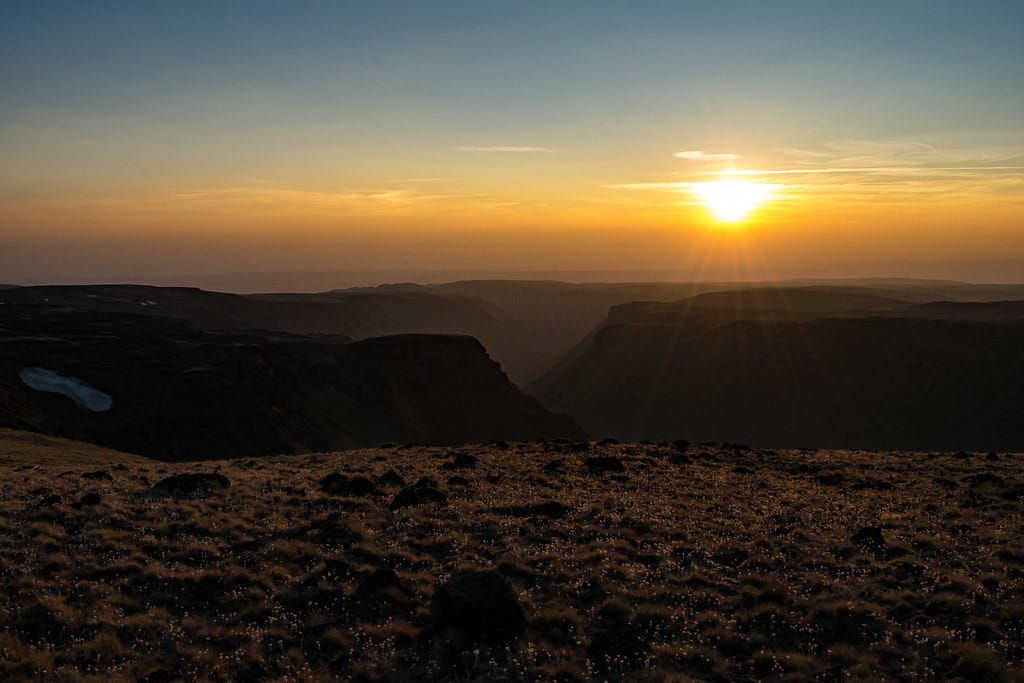Adam Davis: Crescent, Mask
How does our apparently unstoppable attention to differences between us and other people affect our encounters, our work, and how we live together?
Adam Davis works with Oregon Humanities to get people thinking and talking together, and he used to lead backcountry trail crews with the US Forest Service.
Last Wednesday, at the gas station in Crescent (north of Klamath Falls and south of LaPine), the woman at the register wore a mask. None of the other people working there, and none of the other customers, had anything over their noses and mouths. The fading, handlettered sign taped to the door said, “Masks Required.”
Her mask was a version of the American flag—red, white, and blue, some stars and some stripes, all shuffled to fit on the small piece of fabric. I know masks generally do more to protect those nearby than the wearer, but her mask seemed to be a kind of inoculation for her—"yes, I’m wearing a mask,” I read in it, “but don’t confuse me with someone who would do so by choice, someone who might not love our country as much as I do; I’m wearing a mask to keep this place open, and to keep my job.”
My mask, meanwhile, was green. Solid green. And I fitted it closely to my face before meeting eyes over the top of it with the maskless woman who filled up my car, the maskless drivers of the other cars in the station, the other two maskless people in line at the register, the other maskless guy looking for salty food in the small shop to sustain him when he got back on the road.
They looked at me and saw what they saw. I looked at them and saw what I saw. I nodded hello. I made sure to talk with the woman at the register, to ask how she was doing, to say thanks, to wish her a good day. She did the same with me. Her eyes above the flag seemed friendly, warm. I hoped mine seemed the same.

A couple years ago in Portland, I sat in a circle of 18 people at the start of a two-day facilitation training that my organization (Oregon Humanities) was running. The trainer kicked it off by asking us with a big smile and not much explanation to go around and say our names, where in Oregon we were from, and our pronouns. The third person up told us his name, said he was from Cave Junction, and then said, “and I don’t know what exactly you’re asking me to say.” A few people laughed quietly. The trainer explained the pronoun request, and we went on to the next person, name plus location plus “she her hers,” or whatever the case may have been. No one else in the circle paused or stumbled or asked what was being asked of them.
I thought the Cave Junction man’s comment took courage. In front of a group of people new to him, he explicitly declared his own ignorance of something that everyone else, including the organization in charge, seemed to know. He risked ridicule and other forms of judgment or dismissal. And we probably could have spent the two days talking about pronouns rather than sticking to our previously established agenda. We didn’t, but we could have.

Talking about complex, loaded topics is something that my organization works on in a number of ways, including through a program called the Conversation Project—which, under the current coronavirus conditions, we’ve moved online and call Connect in Place. One of many topics we get people talking about is class—socioeconomic class—and I’ve been lucky to lead these conversations about class in approximately a dozen communities around Oregon, including Cave Junction.
Early on in these public conversations, I usually ask people to pair up with someone they don’t know to talk about a recent instance in which they interacted with someone who they took to be in a different class from them—higher, lower, different in some way. I ask them to talk especially about whatever they were paying attention to, what they were noticing, that gave them the sense there were class differences of some kind or another between them.
Once you get going, the list of indicators around class is almost infinite, and almost infinitely fluid: job, shoes, language, teeth, home, race, vehicle, bearing, clothes, and on and on. As we move through the world, we quickly and often helplessly read class into just about every aspect of everyone we encounter. At the same time, we might say that class doesn’t exist, or that it shouldn’t matter, or that it’s a nefarious construct, or that the way most of us understand this important socioeconomic category is flawed.

Whatever we think about class, we read it as we move through the world. We notice aspects of the people we encounter, and we make quick judgments, including judgments that we might wish we weren’t making. We make these judgments about class, and about masks (now), and about gender, and about race and age and plenty of other features of the people we encounter in public. In ways we can’t control and can hardly track, we notice and even judge the people we find ourselves with and among. Good luck to anyone who would stop doing this. We seem to be built for it.
The question on my mind as I drove away from the gas station in Crescent and the training in Portland and the Conversation Projects in Cave Junction and other places around Oregon is what we do next. What do we do with and on account of the judgments we inevitably make? How does our apparently unstoppable attention to differences between us and other people affect our encounters, our work, and how we live together?
One way I try to think about my own attention to and judgments of others—not always a helpful way, and sometimes a self-absorbed way—is to consider what people are reading on me. Usually—not always, but usually—I’d prefer to be treated as if I weren’t being read and judged in advance. I’d prefer to be treated this way even though I believe that everyone is always reading and judging everyone else. I hope those who encounter me will, after they’ve made their quick and inevitable judgments, try to see me fresh—to seek out the eyes behind the mask, the person behind the pronoun, and the individual that does or doesn’t represent the class they associate with my shoes. OK, you’ve noticed these things. Now what? I want people who interact with me to be clear and reflective about the reasons for this treatment rather than reflexive and reactionary, invisible even to them.
Just as I want to clearly see and understand the reasons for how I’m treating others, I want others to see clearly and understand why they’re treating me as they are. That feels like the most I can hope for from myself and others, though it still leaves room for a wide range of treatment. And plenty of the time, for others and for me, even this limited hope may still be too much.
**************************************************
Send feedback to Adam:
@AdamDavisOHm
Keep the conversation going:
Facebook (facebook.com/oregonway), Twitter (@the_oregon_way)
Check out our podcast:
#90




